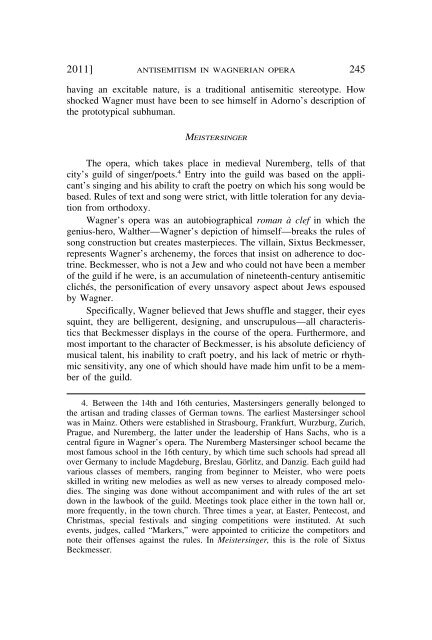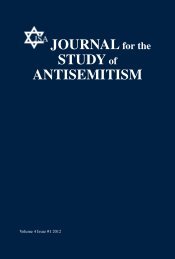JOURNALfor the STUDYof ANTISEMITISM
JOURNALfor the STUDYof ANTISEMITISM
JOURNALfor the STUDYof ANTISEMITISM
Create successful ePaper yourself
Turn your PDF publications into a flip-book with our unique Google optimized e-Paper software.
2011] <strong>ANTISEMITISM</strong> IN WAGNERIAN OPERA 245<br />
having an excitable nature, is a traditional antisemitic stereotype. How<br />
shocked Wagner must have been to see himself in Adorno’s description of<br />
<strong>the</strong> prototypical subhuman.<br />
MEISTERSINGER<br />
The opera, which takes place in medieval Nuremberg, tells of that<br />
city’s guild of singer/poets. 4 Entry into <strong>the</strong> guild was based on <strong>the</strong> applicant’s<br />
singing and his ability to craft <strong>the</strong> poetry on which his song would be<br />
based. Rules of text and song were strict, with little toleration for any deviation<br />
from orthodoxy.<br />
Wagner’s opera was an autobiographical roman à clef in which <strong>the</strong><br />
genius-hero, Wal<strong>the</strong>r—Wagner’s depiction of himself—breaks <strong>the</strong> rules of<br />
song construction but creates masterpieces. The villain, Sixtus Beckmesser,<br />
represents Wagner’s archenemy, <strong>the</strong> forces that insist on adherence to doctrine.<br />
Beckmesser, who is not a Jew and who could not have been a member<br />
of <strong>the</strong> guild if he were, is an accumulation of nineteenth-century antisemitic<br />
clichés, <strong>the</strong> personification of every unsavory aspect about Jews espoused<br />
by Wagner.<br />
Specifically, Wagner believed that Jews shuffle and stagger, <strong>the</strong>ir eyes<br />
squint, <strong>the</strong>y are belligerent, designing, and unscrupulous—all characteristics<br />
that Beckmesser displays in <strong>the</strong> course of <strong>the</strong> opera. Fur<strong>the</strong>rmore, and<br />
most important to <strong>the</strong> character of Beckmesser, is his absolute deficiency of<br />
musical talent, his inability to craft poetry, and his lack of metric or rhythmic<br />
sensitivity, any one of which should have made him unfit to be a member<br />
of <strong>the</strong> guild.<br />
4. Between <strong>the</strong> 14th and 16th centuries, Mastersingers generally belonged to<br />
<strong>the</strong> artisan and trading classes of German towns. The earliest Mastersinger school<br />
was in Mainz. O<strong>the</strong>rs were established in Strasbourg, Frankfurt, Wurzburg, Zurich,<br />
Prague, and Nuremberg, <strong>the</strong> latter under <strong>the</strong> leadership of Hans Sachs, who is a<br />
central figure in Wagner’s opera. The Nuremberg Mastersinger school became <strong>the</strong><br />
most famous school in <strong>the</strong> 16th century, by which time such schools had spread all<br />
over Germany to include Magdeburg, Breslau, Görlitz, and Danzig. Each guild had<br />
various classes of members, ranging from beginner to Meister, who were poets<br />
skilled in writing new melodies as well as new verses to already composed melodies.<br />
The singing was done without accompaniment and with rules of <strong>the</strong> art set<br />
down in <strong>the</strong> lawbook of <strong>the</strong> guild. Meetings took place ei<strong>the</strong>r in <strong>the</strong> town hall or,<br />
more frequently, in <strong>the</strong> town church. Three times a year, at Easter, Pentecost, and<br />
Christmas, special festivals and singing competitions were instituted. At such<br />
events, judges, called “Markers,” were appointed to criticize <strong>the</strong> competitors and<br />
note <strong>the</strong>ir offenses against <strong>the</strong> rules. In Meistersinger, this is <strong>the</strong> role of Sixtus<br />
Beckmesser.














